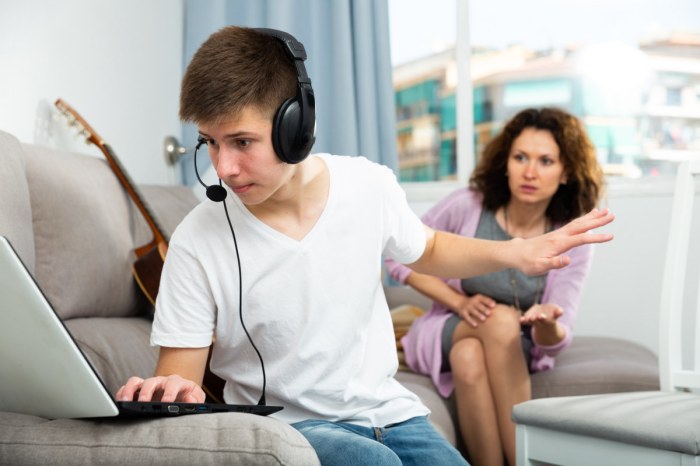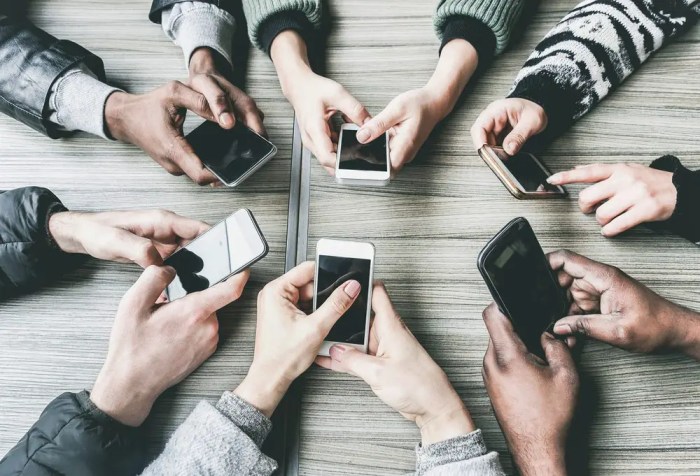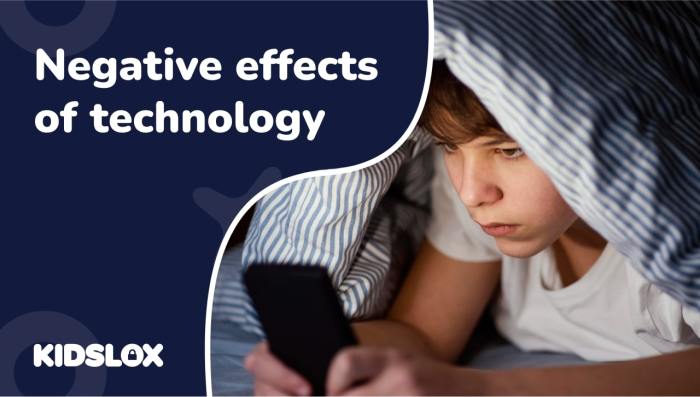Effects of technology addiction on modern relationships – Technology Addiction’s Effects on Modern Relationships are increasingly prevalent in today’s hyper-connected world. Our constant engagement with smartphones, social media, and the internet profoundly impacts how we communicate, build trust, and nurture intimacy within our relationships. This exploration delves into the various ways technology addiction disrupts modern partnerships, examining its influence on communication styles, trust levels, time management, mental health, and physical intimacy.
We’ll explore the subtle and not-so-subtle ways technology seeps into our relationships, often creating more distance than connection.
From the seemingly innocuous habit of checking social media during a date night to the pervasive anxiety caused by constant notifications, technology’s grip on our lives affects our ability to be fully present with our partners. We’ll look at specific examples of how this addiction manifests, the challenges it creates, and strategies for navigating these complexities. The goal is to foster a deeper understanding of this growing issue and empower individuals to build healthier, more fulfilling relationships in the digital age.
Communication Breakdown

Source: capitalchoicecounselling.com
Excessive screen time significantly impacts the quality and quantity of communication within romantic relationships. The constant pull of notifications and the allure of online worlds often overshadow the importance of face-to-face interaction, leading to a gradual erosion of connection and understanding. This isn’t simply about less time spent together; it’s about a fundamental shift in how partners communicate and connect.Technology addiction subtly yet powerfully alters the dynamics of communication, particularly regarding nonverbal cues.
Nonverbal communication—body language, tone of voice, facial expressions—plays a crucial role in conveying emotions and building intimacy. When partners are constantly glued to their screens, these subtle cues are missed or misinterpreted, leading to misunderstandings and emotional distance. The richness of a shared glance, a comforting touch, or a knowing smile is lost in the digital ether.
Impact of Screen Time on Face-to-Face Communication
Excessive screen time directly correlates with reduced face-to-face communication. Couples who spend hours engrossed in their devices often find themselves having fewer meaningful conversations, sharing less about their day, and neglecting opportunities for genuine connection. Dinner conversations are punctuated by phone notifications, weekend outings are interrupted by social media updates, and even bedtime is often spent scrolling through feeds instead of cuddling and talking.
This constant distraction creates a sense of emotional detachment and reduces the quality of shared experiences. For example, a couple might be physically present on a date but emotionally absent, each engrossed in their respective devices, resulting in a hollow and unsatisfying experience.
Technology Addiction’s Effect on Nonverbal Cues and Emotional Connection
The reliance on digital communication hinders the ability to interpret and respond to nonverbal cues. Text messages lack the nuance of tone and facial expressions, leading to misinterpretations and conflict. Emojis and GIFs can attempt to compensate, but they often fall short of conveying the complexity of human emotion. This absence of nonverbal cues weakens the emotional bond between partners.
For instance, a sarcastic remark in a text might be misinterpreted as genuine anger, leading to unnecessary arguments. The lack of physical presence also limits the expression and interpretation of comforting gestures like a hug or a reassuring touch, vital components of emotional intimacy.
Prioritizing Online Interactions Over In-Person Time
Prioritizing online interactions over in-person time significantly damages relationships. When one or both partners consistently choose virtual connections over real-life interactions, it sends a message of disinterest and disengagement. This creates a sense of neglect and loneliness, fueling resentment and insecurity. For example, a partner who spends more time gaming online than engaging with their spouse will likely experience a decline in the quality of their relationship, leading to feelings of being undervalued and unappreciated.
Similarly, spending hours on social media, comparing oneself to others’ seemingly perfect lives, can lead to dissatisfaction and insecurity within the relationship.
Communication Styles in Technology-Addicted vs. Non-Addicted Couples
| Communication Style | Technology-Addicted Couple | Non-Addicted Couple |
|---|---|---|
| Frequency of Face-to-Face Interaction | Infrequent, often interrupted by devices | Frequent, uninterrupted, and focused |
| Quality of Communication | Superficial, often lacking emotional depth | Meaningful, emotionally rich, and engaging |
| Nonverbal Communication | Limited, misinterpreted, or ignored | Present, understood, and utilized to enhance connection |
| Conflict Resolution | Often escalated due to miscommunication | More effective due to clear communication and empathy |
Trust and Jealousy Issues
Technology addiction significantly impacts trust and intimacy within modern relationships. The constant connection to digital devices and the allure of online interactions create fertile ground for suspicion, jealousy, and ultimately, the erosion of trust. This pervasive digital presence can blur the lines of acceptable behavior, leading to secretive online activities and a breakdown in open communication.The potential for infidelity and secrecy is significantly heightened by the anonymity and accessibility offered by the internet and social media.
Online platforms provide opportunities for clandestine relationships and interactions that can remain hidden from a partner. The ease of creating multiple online personas and engaging in private messaging makes it easier to conceal potentially damaging behavior. This lack of transparency breeds mistrust, creating a breeding ground for conflict and resentment.
Potential for Infidelity and Secrecy Fostered by Online Activities
The sheer volume of online interactions available to individuals today can easily lead to emotional, and sometimes physical, infidelity. The constant stream of messages, likes, and comments from various sources can create a sense of validation and attention that a partner may feel they are lacking. For example, a person addicted to social media might spend hours engaging with online acquaintances, neglecting their partner’s needs and fostering a sense of emotional distance.
This behavior can easily lead to a feeling of being betrayed and unloved, regardless of whether there’s a physical affair. Furthermore, the ease of accessing pornography or engaging in sexually explicit conversations online provides additional avenues for infidelity, often hidden behind the veil of technology addiction. The secrecy surrounding these activities further compounds the damage to trust.
Technology addiction often leaves little room for genuine connection in modern relationships, leading to increased isolation and communication breakdowns. This constant pursuit of digital stimulation mirrors the unsustainable consumption driving a luxury lifestyle, as highlighted in this insightful article on Luxury lifestyle and its environmental footprint. Just as overconsumption harms the planet, excessive technology use can damage the health of our relationships, leaving us feeling empty and disconnected.
Technology Addiction Fueling Mistrust and Jealousy
Technology addiction often manifests in behaviors that fuel mistrust and jealousy. Excessive time spent online, coupled with secretive password practices and hidden notifications, can create a climate of suspicion. For instance, a partner who constantly checks their phone during conversations or avoids eye contact might be signaling a lack of engagement and a prioritization of the digital world over their relationship.
This behavior can lead the other partner to feel insecure and undervalued, triggering feelings of jealousy and resentment. The constant comparison of one’s own relationship to the seemingly perfect lives portrayed on social media further exacerbates these issues, leading to unrealistic expectations and heightened insecurities.
Examples of Technology Use Breeding Suspicion and Conflict
Consider a scenario where one partner consistently stays up late, secretly scrolling through social media, while the other partner feels neglected and alone. Another example could involve a partner receiving numerous mysterious messages or calls that they refuse to explain, creating a sense of secrecy and suspicion. A more extreme example could involve the discovery of hidden online profiles or explicit messages, leading to a major crisis of trust.
These examples illustrate how technology use, fueled by addiction, can easily escalate into significant relationship conflicts.
Strategies for Building Trust in the Face of Technology Addiction
Building trust in a relationship affected by technology addiction requires conscious effort and open communication from both partners. Here are some strategies couples can implement:
- Open and Honest Communication: Establish clear boundaries regarding technology use and agree on times when devices should be put away to foster quality time together.
- Shared Access and Transparency: Consider sharing passwords (if comfortable) and making online activities more transparent. This fosters a sense of openness and reduces suspicion.
- Professional Help: Seek professional help from a therapist or counselor specializing in addiction and relationship issues. This can provide a safe space to discuss concerns and develop coping mechanisms.
- Focus on Quality Time: Prioritize in-person interactions and activities that strengthen the bond between partners. This can help rebalance the relationship and reduce reliance on technology for connection.
- Establish Tech-Free Zones and Times: Designate specific times and places where technology use is restricted, such as during meals or before bed. This creates opportunities for uninterrupted connection.
Time Management and Neglect
Technology addiction significantly impacts time management, often leading to the neglect of partners and shared responsibilities. The constant pull of social media, games, or online communication diverts attention and energy away from real-life relationships, creating a rift between partners and fostering feelings of resentment and loneliness.The prioritization of online engagement over face-to-face interaction directly correlates with decreased relationship satisfaction.
When one partner consistently chooses virtual worlds over quality time with their loved one, it breeds feelings of inadequacy, insecurity, and ultimately, unhappiness. This neglect can manifest in various ways, ranging from missed dates and conversations to a general lack of emotional support and physical intimacy.
Disrupted Routines and Shared Activities
Technology addiction disrupts established routines and shared activities in numerous ways. Couples who once enjoyed regular date nights or family dinners may find these replaced with solitary screen time. Shared hobbies and activities may be neglected as the allure of online engagement becomes more compelling. For instance, a couple who used to go hiking every weekend might find themselves spending those weekends separately, one engrossed in a video game and the other feeling ignored and left out.
The consistent displacement of real-life interactions with online activities leads to a gradual erosion of the relationship’s foundation, weakening the bonds that hold the couple together. Even seemingly simple routines like watching television together can be disrupted, with one partner constantly checking their phone or responding to notifications, interrupting shared moments and creating a sense of disconnection.
Impact of Technology Use on Relationships
| Time Spent on Technology | Communication | Quality Time | Emotional Intimacy |
|---|---|---|---|
| Low (Less than 1 hour/day) | Open and frequent | Abundant and fulfilling | Strong and secure |
| Moderate (1-3 hours/day) | Occasional interruptions | Adequate but sometimes rushed | Some strain, potential for conflict |
| High (Over 3 hours/day) | Infrequent and superficial | Minimal to none | Weak, feelings of neglect and resentment |
Mental Health and Relationship Dynamics
Technology addiction significantly impacts mental well-being, creating a ripple effect that disrupts relationship dynamics. The constant connection and stimulation offered by technology can lead to increased stress levels, impacting emotional regulation and communication within a partnership. This, in turn, fuels relationship conflict and erodes the foundation of trust and intimacy.The addictive behaviors associated with technology, such as compulsive checking of social media, excessive gaming, or endless scrolling, directly contribute to a decline in mental health.
These behaviors often displace activities that promote well-being, such as exercise, socializing, or pursuing hobbies. The constant pursuit of online validation can lead to feelings of inadequacy and low self-esteem, further impacting relationships. Neglecting real-life interactions in favor of virtual ones can create a sense of isolation and distance, fostering feelings of loneliness and resentment within the relationship.
Technology addiction is seriously impacting modern relationships; constant phone checking and social media scrolling create distance and hinder genuine connection. Ironically, achieving a balanced life, free from this digital distraction, could be a key selling point when Creating a luxury lifestyle brand for entrepreneurs , focusing on products or services that promote mindfulness and well-being. Ultimately, escaping technology’s grip is crucial for healthier relationships and a more fulfilling life.
Technology Addiction, Stress, and Relationship Conflict
The correlation between technology addiction, stress, and relationship conflict is strong. When individuals are constantly bombarded with notifications, messages, and the pressure to maintain an online presence, their stress levels rise. This heightened stress can manifest as irritability, impatience, and difficulty focusing, leading to increased arguments and misunderstandings with partners. For example, a partner constantly checking their phone during a conversation might unintentionally convey disinterest or disrespect, triggering conflict.
The inability to disconnect from technology can also lead to sleep deprivation, further exacerbating stress and negatively affecting mood and communication. This continuous cycle of stress, fueled by technology addiction, creates a volatile environment detrimental to healthy relationships.
Negative Impacts of Addictive Behaviors on Mental Well-being and Relationships, Effects of technology addiction on modern relationships
Technology addiction’s detrimental effects on mental well-being often spill over into relationships. The time spent engaging in addictive behaviors is time taken away from quality time with a partner. This lack of attention can lead to feelings of neglect, insecurity, and ultimately, resentment. The constant comparison to idealized online personas can foster feelings of inadequacy and jealousy, further straining the relationship.
Furthermore, the addictive nature of technology can lead to secrecy and dishonesty, as individuals may hide their usage from their partners to avoid confrontation or judgment. This lack of transparency erodes trust and intimacy, creating a significant barrier to a healthy relationship.
Examples of Technology Addiction Contributing to Depression, Anxiety, and Isolation
Technology addiction can contribute to depression and anxiety in several ways. The constant exposure to curated online lives can fuel feelings of inadequacy and social comparison, leading to low self-esteem and anxiety. The fear of missing out (FOMO) can create a sense of urgency and pressure to constantly be connected, leading to sleep deprivation and increased stress. Isolation is another significant consequence.
Technology addiction often leaves little room for genuine connection, impacting the quality of modern relationships. Ironically, the constant pursuit of online validation can distract from the simple joys that actually enrich life, making it harder to prioritize real-world experiences. Learning to manage finances effectively, perhaps even exploring strategies like those outlined in this article on Maintaining a luxury lifestyle on a modest income , could free up time and resources to foster healthier relationships.
Ultimately, a balanced approach to technology and mindful spending contributes to stronger connections.
Individuals may prioritize online interactions over real-life connections, leading to a sense of loneliness and detachment from their partners and other loved ones. For instance, a person spending hours gaming might neglect their partner’s needs, leading to feelings of isolation and unhappiness. The lack of face-to-face interaction can weaken the emotional bond, leading to a sense of disconnect and emotional distance.
Illustration of the Cyclical Nature of Technology Addiction and its Impact on Relationship Health
Imagine a circular diagram. At the top is “Technology Addiction,” represented by a phone with glowing notifications. Arrows point downwards to “Increased Stress and Anxiety,” depicted by a person with a furrowed brow and tense shoulders. From there, arrows lead to “Relationship Conflict,” shown as two figures arguing. This conflict then leads to “Decreased Intimacy and Trust,” symbolized by two figures standing far apart with a visible chasm between them.
Finally, arrows point back up to “Technology Addiction,” completing the cycle. The diagram visually represents how technology addiction fuels stress and anxiety, leading to relationship problems, which in turn further reinforces the addictive behavior, creating a vicious cycle that negatively impacts relationship health. The cycle continues, worsening the mental health of individuals involved and damaging the relationship.
Technology addiction often strains modern relationships, creating distance and hindering genuine connection. Ironically, the constant pursuit of status symbols, often fueled by social media, mirrors the pressures described in this article on the Hidden costs of maintaining a luxury lifestyle , where the superficial replaces genuine interaction. This relentless cycle further isolates individuals, worsening the already fragile state of many modern relationships.
Impact on Intimacy and Physical Affection

Source: parentingteenagersacademy.com
Excessive technology use significantly impacts the intimacy and physical affection within modern relationships. The constant distraction of screens creates a barrier between partners, hindering genuine connection and emotional closeness. This pervasive influence subtly, yet powerfully, reshapes the dynamics of romantic partnerships, often leading to a decline in both physical and emotional intimacy.The constant presence of technology creates a competitive distraction, vying for attention with the partner.
This competition for attention can lead to feelings of neglect and resentment, further eroding the foundation of a healthy relationship. The immediate gratification offered by social media and other digital platforms often outweighs the slower, more nuanced rewards of physical intimacy and genuine emotional connection.
Physical Affection Levels in Couples
Couples struggling with technology addiction often exhibit significantly lower levels of physical affection compared to those without such issues. Studies (while not definitive due to the complexity of measuring such things) suggest a correlation between increased screen time and decreased frequency of physical touch, such as cuddling, kissing, and holding hands. This reduced physical contact can lead to a sense of emotional distance and disconnection, impacting the overall health and satisfaction of the relationship.
For instance, a couple constantly glued to their phones during dinner might miss out on the nonverbal cues and shared moments that strengthen their bond. Conversely, couples who prioritize technology-free time often report higher levels of physical intimacy and satisfaction.
Technology’s Interference with Quality Time and Intimacy
Technology frequently interferes with quality time and physical intimacy in several ways. For example, constant phone notifications interrupt conversations, creating a sense of disengagement and lack of attentiveness. The urge to check social media or respond to messages can disrupt intimate moments, diminishing the quality of shared experiences. Imagine a couple trying to enjoy a romantic evening, only to have one partner constantly checking their phone.
This constant interruption disrupts the flow of intimacy and can leave the other partner feeling undervalued and unheard. Even during physical intimacy, the presence of a phone nearby can create a sense of distance and distraction, preventing full engagement and emotional connection. The simple act of putting phones away and engaging fully in the present moment can dramatically improve the quality of interactions.
Strategies to Increase Intimacy Despite Technology Use
Establishing clear boundaries around technology use is crucial for fostering intimacy. This involves designating specific times for technology-free interaction, such as designated “phone-free” hours or days. Creating a technology-free zone, such as the bedroom, can also help.
- Schedule regular technology-free dates: Plan specific activities that require undivided attention and encourage physical intimacy, such as going for a walk, cooking a meal together, or engaging in a hobby.
- Create a “phone-free” zone: Designate certain areas, like the bedroom or dining table, as technology-free zones to encourage more face-to-face interaction.
- Practice mindful presence: When spending time together, actively put away phones and engage fully in the conversation or activity. Focus on connecting with your partner emotionally and physically.
- Communicate openly and honestly: Discuss concerns about technology use and its impact on the relationship. Work together to establish healthy boundaries and expectations.
- Seek professional help if needed: If technology addiction is significantly impacting the relationship, consider seeking guidance from a therapist or counselor specializing in relationship issues and technology addiction.
Social Isolation and Relationship Strain: Effects Of Technology Addiction On Modern Relationships
Technology addiction significantly impacts social interactions, leading to isolation and straining relationships. The constant engagement with digital devices and online platforms often comes at the expense of face-to-face communication and real-world connections, creating a disconnect between individuals and their support networks. This isolation can negatively affect both individual well-being and the health of their relationships.The constant need to check notifications, scroll through social media feeds, or engage in online games diverts attention and energy away from real-life relationships.
This neglect can lead to feelings of resentment, loneliness, and ultimately, relationship breakdown. The immersive nature of technology can create a sense of virtual connection that often fails to replace the depth and richness of genuine human interaction.
Neglect of Real-Life Social Interactions
Neglecting real-life social interactions due to excessive technology use strains relationships by fostering a sense of emotional distance. Partners might feel ignored, unappreciated, and unimportant when their loved one prioritizes online engagement over spending quality time together. This lack of attention can lead to communication breakdowns, conflict, and ultimately, the erosion of the relationship’s foundation. The constant presence of technology can act as a barrier, preventing genuine connection and intimacy.
For example, a couple might be sitting together on the sofa, but one partner is engrossed in their phone, completely unresponsive to the other. This constant distraction creates a sense of emotional detachment and undermines the quality of their time together.
Isolation from Support Systems
Technology addiction can isolate individuals from their crucial support systems, impacting their relationships. Spending excessive time online can lead to a decline in face-to-face interactions with friends and family, weakening existing bonds and hindering the formation of new ones. This lack of social support can exacerbate stress, anxiety, and depression, further straining relationships as individuals struggle to cope with their emotional burdens without the aid of their support network.
For instance, someone addicted to online gaming might withdraw from family gatherings, neglecting their responsibilities and pushing loved ones away.
“I used to spend every weekend with my friends, but now I prefer to stay home and play games online. I feel guilty about it, but I just can’t seem to stop.”
This example highlights how technology addiction can lead to social isolation and damage relationships with friends and family. The individual’s dependence on online activities overrides their desire for real-life connections, creating a significant rift between themselves and their support network.
Impact of Social Media Comparisons and Idealized Online Lives
Social media platforms often present an idealized version of reality, showcasing curated images and experiences that can negatively affect self-esteem and relationship satisfaction. Constant exposure to seemingly perfect lives can lead to feelings of inadequacy, jealousy, and insecurity, impacting both individual well-being and the dynamics within relationships. Partners might compare themselves to others, leading to dissatisfaction with their own relationship or even triggering feelings of inadequacy.
“I constantly compare my relationship to the seemingly perfect couples I see on Instagram. It makes me question whether my relationship is good enough.”
This illustrates how social media comparisons can fuel insecurity and negatively impact relationship satisfaction. The curated nature of online profiles often misrepresents reality, creating unrealistic expectations and fueling dissatisfaction with one’s own life and relationships. The constant exposure to idealized images can contribute to feelings of low self-worth and erode confidence within a relationship.
Last Point

Source: kidslox.com
In conclusion, the effects of technology addiction on modern relationships are far-reaching and complex. While technology offers undeniable benefits in communication and connection, its overuse can significantly strain intimacy, trust, and overall relationship satisfaction. Recognizing the signs of technology addiction and actively working towards a healthier balance between online and offline interactions is crucial for nurturing strong, fulfilling relationships.
By prioritizing quality time, open communication, and mindful technology use, couples can navigate the challenges of the digital age and cultivate deeper connections that transcend the screen.
Query Resolution
What are some early warning signs of technology addiction in a relationship?
Early signs include neglecting partner’s needs for online activities, increased secrecy about online behavior, frequent arguments about technology use, and noticeable withdrawal from in-person interactions.
How can couples set healthy boundaries around technology use?
Establish designated “tech-free” times, create shared rules for phone use during meals or conversations, and openly communicate about concerns and frustrations regarding technology use.
What role does social media play in relationship jealousy?
Social media’s curated nature can fuel unrealistic comparisons, leading to insecurity and jealousy. Seeing idealized versions of others’ lives can create feelings of inadequacy and mistrust within a relationship.
Can couples therapy help address technology addiction’s impact on relationships?
Absolutely. Couples therapy provides a safe space to discuss technology-related issues, develop coping strategies, and improve communication to address the underlying problems caused by technology addiction.
Are there specific apps or tools that can help manage technology use?
Yes, many apps track screen time, limit access to certain apps, and provide insights into usage patterns. These can be helpful tools in managing technology consumption.




